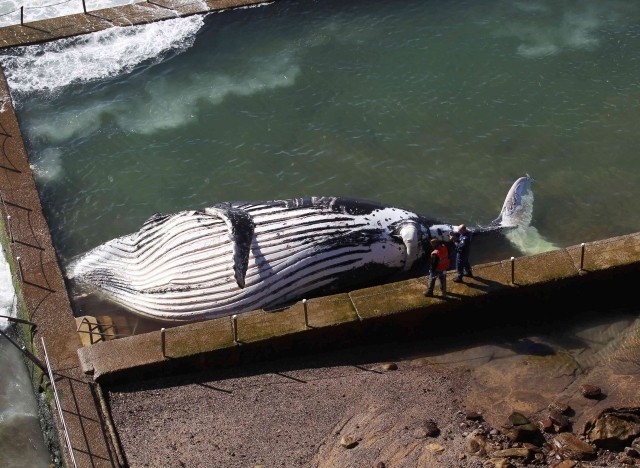Giant Humpback Whale Found Dead in Australian Beach Swimming Pool [PHOTOS]
People of Newport in Sydney woke up on Wednesday to find a humpback whale (Megaptera novaeangliae) that washed up dead in a beach side swimming pool.
The giant sea mammal, weighing about 30 tons, had been dead for three to four days before the carcass washed into the rock pool at Newport Beach on Tuesday night, authorities investigating the cause of the whale's death said, according to local media.
The carcass of the animal was dissected and buried on the beach on Thursday while tissue samples for DNA tests have been stored to help create a genetic base for the world's humpback population. Meanwhile, authorities have warned of increased shark activities because of the carcass near Newport Beach, the Herald Sun reported.
According to National Parks and Wildlife Service staff involved in disposing of the carcass, which was producing a foul smell in the locality, the whale was quite young, about five to seven years old, and would have died from natural causes, most probably from an infection in its respiratory tract.
However, the whale's blubber was about three times thinner than that in normal, healthy whales. This also suggests that the humpback whale had been sick and malnourished.
Overfishing
Though the actual cause of the death of the animal has not been identified, the possibility of malnourishment as a cause indicates the impact of overfishing in the Pacific Ocean.
The global fish stock is declining since industrial fishing began in the 1950s, according to a Greenpeace report, Ocean in Crisis, on the scenario of overfishing around the world. The report says that the Pacific regions, including the Australian seas, are being exploited the most in the current situation.
"Having fished out their own waters, countries like Japan, European Union member states, Taiwan, Korea, the United States and China are now sending their industrial fishing fleets to the Pacific to exploit the region's stocks," it says. "Armed with sophisticated technologies, we're catching fish beyond nature's ability to replenish the seas. 90% of the oceans' large predatory fish, such as tuna, swordfish, marlin and sharks, have been taken from our oceans."
In another recent incident of a beaching of a young humpback whale, fishing was held responsible. A giant humpback whale, thought to be about three years old, was injured by a heavy nylon line entangled in its mouth when it washed ashore alive at White Rock along the British Columbia coast in June; it died soon after. The nylon line was probably a commercial fishing gear.
Pictures below show the carcass of the humpback whale that washed up dead in the beach pool at Newport Beach:






© Copyright IBTimes 2025. All rights reserved.





















